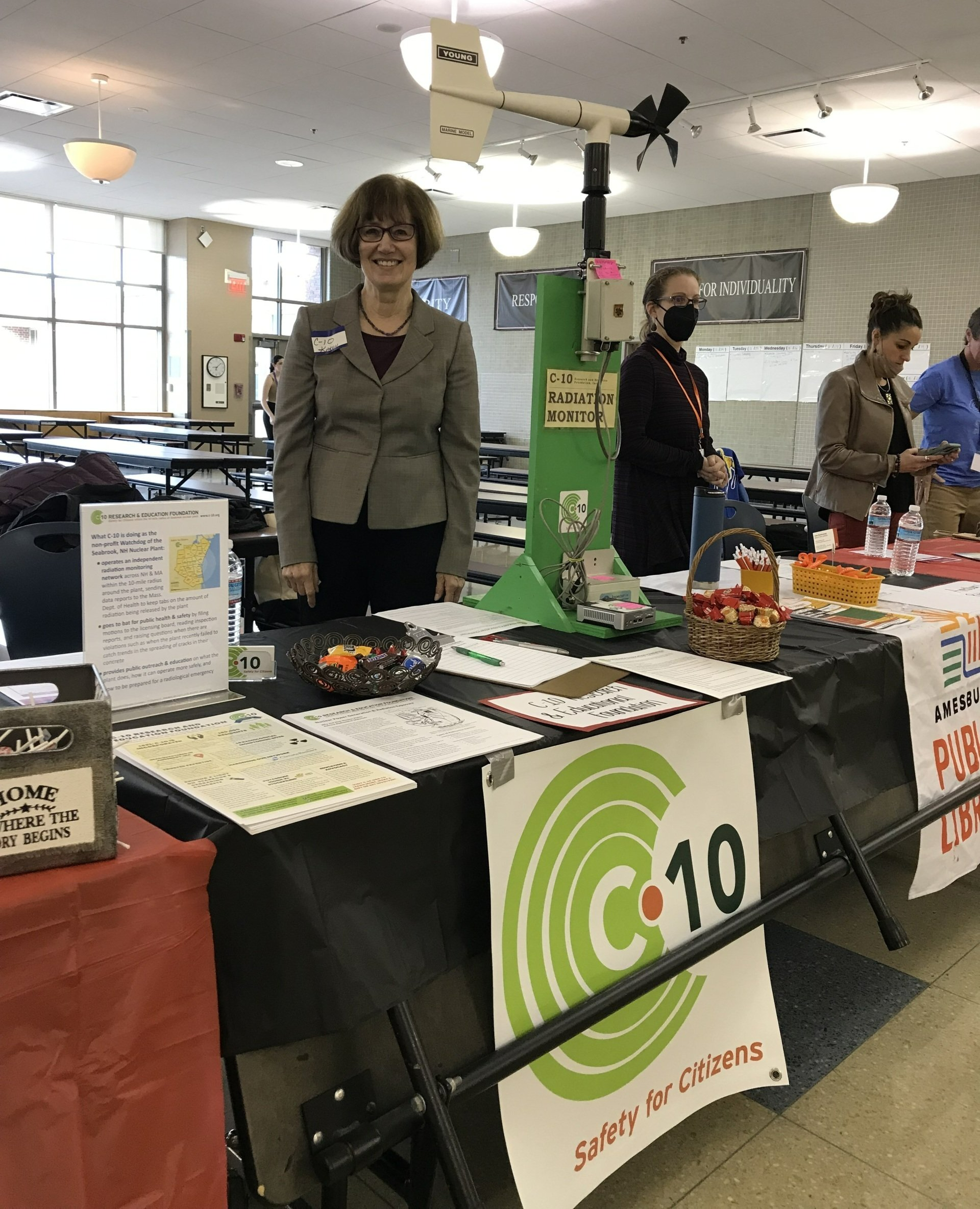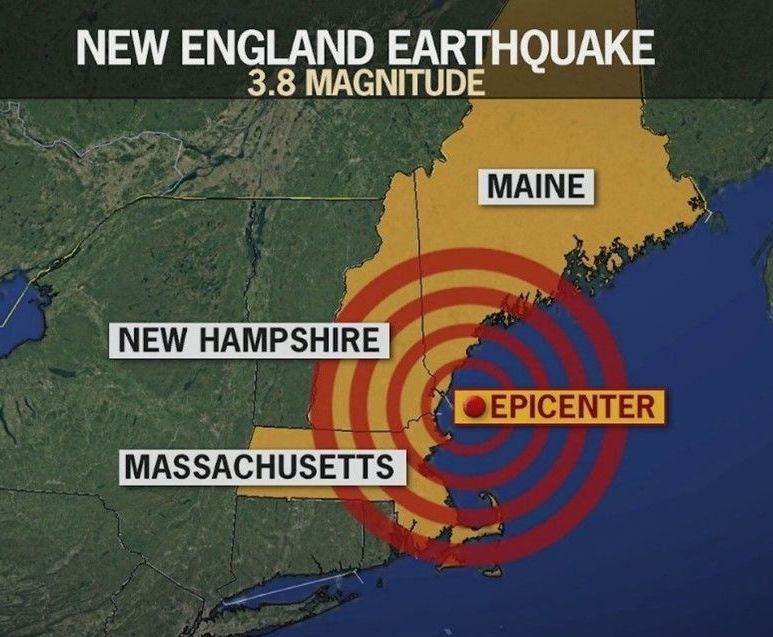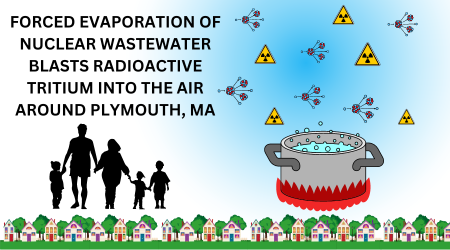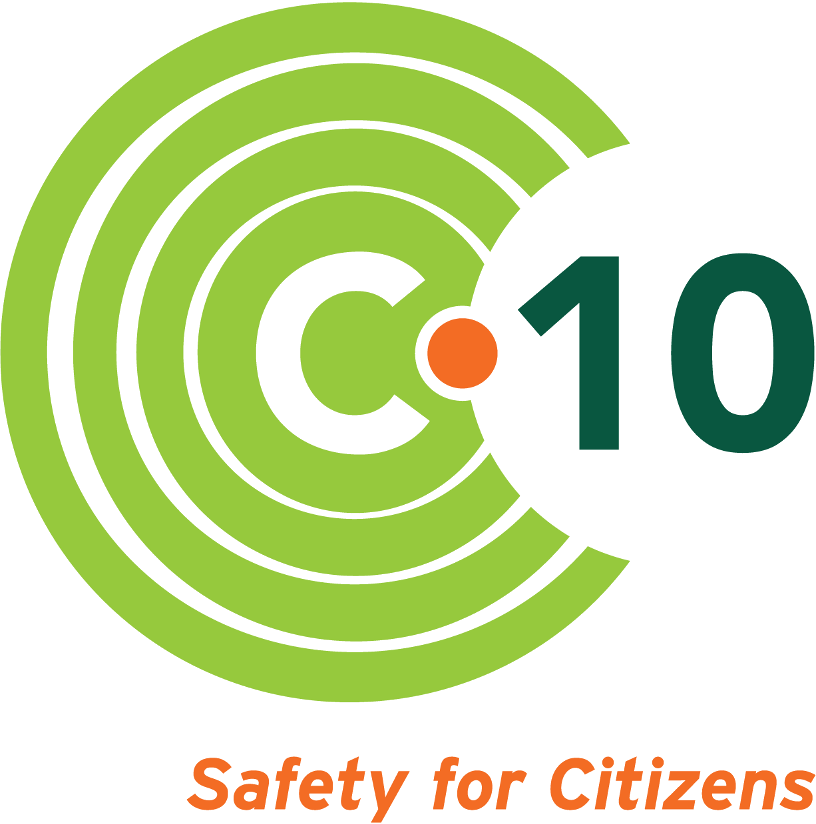C-10 & The Public: Knowledge Sharing is Critical to Outreach
- By Karen Calgett
- •
- 30 Dec, 2022
C-10 has spoken at dozens of events in 2022 and found that outreach and education is a two-way street. Often times we learned valuable information from the groups that we sought to educate.

How C-10 gets the word out and what we learn while doing it!
We have all heard the saying, “You can’t fight City Hall,” and we have all at times bemoaned the perceived difficulty of an individual making a real difference in solving society’s problems. But, since its inception over 30 years ago, C-10 has exemplified what a small group of committed citizens can do.
As a result, C-10 now has over 900 members, ten Board of Directors Members, and a roster of Advisory Board members nationwide representing various fields of nuclear, regulatory, and other areas of expertise, as well as two paid professionals on staff, our Executive Director and our Network Administrator. We are delighted to have such valuable support to deliver our services to the more than 170,000 people living within the 10-mile radius of the Seabrook Nuclear plant. However, we recognize that C-10 needs to reach more of the area’s citizens to increase awareness and to supply important information about what it means to live near a nuclear reactor, as well as what we all can do to push for the utmost safety measures.
In the past six months, Sarah Abramson, C-10 Executive Director, and Karen Clagett, Head of Education and Outreach, have traveled to a number of community events and organizations to spread information on Seabrook Station , nuclear safety, and C-10’s efforts to fulfill its mission to help keep the environment and the people of the Seacoast safe.
We have spoken before the Newburyport, Amesbury, and Exeter Rotary Clubs, the Amesbury Lions’ Club, the high school coalition Seacoast Students for Sustainability (SS4S), the annual meeting of the Quaker Hill Foundation, and the Riverwoods residential community in Exeter, NH. Board members have represented C-10 at internship fairs in Amesbury and Newburyport. We held a successful social and fundraising Art Auction event in November, and an appearance at the Newburyport Non Profit Pop up park in December. We used all of these opportunities to educate our fellow citizens, and in turn C-10 has learned a lot from the people we have met along the way this year.


Once such a theme that we kept hearing was that there is a great deal of confusion among the general populace about the operating status of Seabrook Station. We have been asked, “Is it still online?” “Isn’t the license about to expire?” “Is C-10 anti-nuclear?” “Is a nuclear plant clean energy?” “What are Potassium Iodide (KI) tablets, what do they do, and how do we get them?” “Do you test soil or water?” “What can we do?”
So let’s begin to clear a few things up.
C-10 is not anti-nuclear; it is pro-safety. C-10 recognizes that Seabrook Station supplies significant energy for New England’s needs. C-10 works to ensure, however, that the nuclear industry’s “bottom line” does not take precedence over the health of the region. C-10’s 18 monitoring sites (soon, we hope to be 19) in Massachusetts and New Hampshire keep track of the levels of beta and gamma radiation in the air 24/7/365 and send automated reports of their readings in real time. C-10’s Research Team, which includes both a physicist and a chemist, studies all quarterly NRC inspection reports on the plant and all scientific and public press coverage of nuclear energy and safety. Any concerns are taken up with the NRC’s resident inspectors or other appropriate offices of the Nuclear Regulatory Commission. Concerns are also shared with local, state, and national political figures, many of whom have been very supportive.
Is the plant still online? Yes. Its original license was for thirty years expiring in 2030, and that has recently been extended by the NRC for 20 additional years to 2050. Some proponents of nuclear energy suggest issuing license extensions to allow nuclear plant operation for a full 100 years. C-10 realizes that the plant was state of the art in the '70s, but it is not now and will continue to move further away from the best available current technology as the licensed years continue to pass.
What are C-10's current concerns? Among them is the fact that there have been a number of violations at the Seabrook plant cited by the NRC in its inspection reports, and some involve the monitoring of degraded concrete. C-10 has filed a petition asking for more supervision and defined timelines for remediation of these violations. Recently, our Executive Director and Board members defended our petition to the NRC Performance Review Board. We have been in close contact with legislative offices at the state and Congressional level in both MA and NH, especially the staunch nuclear safety advocate Massachusetts Senator Markey to outline our questions and concerns. Senator Markey has particular interest and authority in this arena given his role on the Senate Energy Committee. We are also concerned about the safety of the radioactive spent fuel gathered during nearly 30 years of operation and stored at the plant site.
Is nuclear energy “clean”? No and yes! It is true that the actual production of energy from the nuclear reactor does not involve CO2 emissions, but constructing a nuclear power plant compound, decommissioning it, the transportation of fuel to the plant, the future potential of moving the over 80,000 pounds and growing of nuclear waste away from the plant, and the mining and processing of uranium all have CO2 implications.
What are KI tablets? KI stands for Potassium Iodide. In the event of a nuclear incident, especially if residents are asked to shelter in place, KI tablets can protect the thyroid from the radioactive iodine that would be released from the nuclear reactor. They should only be taken if/when a health official dictates that it is necessary during a radiological emergency. These pills do not protect any other areas of the body. The most important individuals to use KI in a nuclear event would be pregnant women and young children. By law these KI tablets are free to anyone residing within the 10-mile EPZ radius, but each state and also town has its own means of distributing them, which creates confusion, inconsistency, and a low rate of residents actually having these on hand in their homes for an emergency. C-10 is planning a program for 2023 to understand why so many local residents don’t know about these pills and why they don't have them. This will help us create a framework to assist the responsible municipal groups in getting more KI Pills in more homes by 2024. This will involve creating a database of all the schools within the 17 EPZ communities, and issuing a survey to those schools and a sampling of local residents, to strategize where and how outreach and KI pill-delivery activities will take place.
Does C-10 test soil or water? As a relatively small organization, we have homed in on the specific area of air-radiation monitoring, but we hope to engage graduate students at a local college or university to encourage radiological testing of the soil and water in the area. The states of MA and NH do have some soil, water, and dairy testing for radionuclides as required by law.
What can I do as a citizen? Finding out about your community’s KI Pill policy and obtaining KI is one action. Obtaining a copy of the most current evacuation plan, which should have been mailed to every person living inside the 10-mile EPZ radius is another. Also, being sure to pay attention to news articles and broadcast feature stories on nuclear plants and spreading the word among your friends and familyare other actions. Signing up for C-10’s monthly electronic newsletter can help to keep you informed. Contributing to C-10 can help us in the important work we do for you. Looking through the various resources across our website can help you with all of these!
Over 300 people went to our website on July 12, 2022 when Seabrook Station set off a false evacuation alarm at New Hampshire beaches. There were dozens of calls, emails, and social media inquiries directed to us to see whether we were reading dangerous levels of radiation across our real-time radiation monitoring network. Those citizens knew that C-10 could help provide accurate and reliable information, during the over one-hour timeframe when none of the nuclear plant staff, NRC federal regulators, or NH state officials were providing confirmation that there was no emergency.
Follow us



